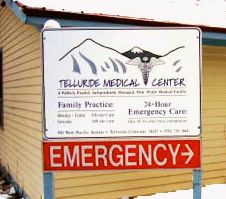
03 May MEDICAL MOMENT: VISITS TO THE ER, MAKING IT EASIER
Telluride Inside… and Out is proud to feature the Telluride Medical Center’s MEDICAL MOMENT, a weekly column that answers common medical questions in pop culture. Have a question for the doctors? Click here to send.
Dr. Dan Hehir answers this week’s question:
What can I do now to make my next Emergency Department visit easier?
Patients often ask me what they can do to make their next Emergency Department visit easier.
While it’s not something we like to think about, it is, unfortunately, likely many of us will, at some point, wind up a patient in an Emergency Department. The following are a few simple steps you can take now to make your visit much easier so that you can concentrate on the what matters most – getting well.
1) Make sure you have health insurance. Understand what it covers and doesn’t cover. Unplanned medical bills cause financial catastrophe in 60% of bankruptcy cases. None of us expect to have an illness or accident that changes our lives, but when we do, bills can pile up fast. Health insurance is expensive but there are high deductible plans that are relatively affordable. In the event of a serious illness or accident they can prevent you from incurring overwhelming financial liability.
Check into what is available through an internet healthcare broker or a local insurance agent. You may be surprised by how affordable a catastrophic plan can be. Secondly, understand what your insurance covers. Even plans that cover 70% or 80% of your health care costs can be financially devastating if a serious health problem presents itself. It is best to have a cap on your maximum out of pocket expense that is within your ability to cover.
2) Carry your insurance information with you at all times. An easy way to do this is to carry your insurance card in your wallet. Another tip is to take a picture of the card with your smart phone to keep on your phone or email it to yourself.
3) Keep a copy of pertinent medical information where it can be accessed easily. This should include an updated list of your medications, drug allergies, previous medical problems and surgeries and emergency contact information. Keep track of your immunization status, especially the date of your last tetanus shot.
Many patients carry a hard copy of this in their wallets. New technology has made it very easy to save this information on a smartphone, in cloud storage, or in an email file. There are also many good apps to keep track of this information as well. When discharged from a hospital, get copies of your medical records, especially your admission history, physical and your discharge summary. These important documents contain 95% of the information needed later.
Carry a copy of your most recent ECG. I have patients take a picture of their ECG with their smartphones for future use.
If you are a Telluride Medical Center patient be sure to set up a health care internet portal on our website. With this you can view your Telluride Medical Center health care records remotely.
4) When you are separated from your children be prepared if they should need medical help. If you are travelling without your children or vice versa make sure you and whoever is taking care of them is prepared. All of the above applies as well, so make sure they have copies of insurance cards, pertinent medical history, list of medications and drug allergies.
Your contact information should be readily available with all possible numbers for contacting you included. Additionally, a letter should be written clearly stating who is in charge of medical decision-making in the event you are not available. This should be notarized.
5) Make sure you have an advanced directive signed with your primary care physician and assign a health care proxy. This is important in the event you cannot make decisions for yourself due to injury or illness. Be clear about how you want to be taken care of and who will be responsible for making those decisions. Having an advanced directive and appointing a health care proxy are the best ways of doing this. Also, share this information with your family and friends.
When illness or injury force you or your family to seek help at an Emergency Department it is best to be prepared. A little preparation can prevent wasted time tracking down insurance information, medical consents for your children, lists of medications, allergies and details about previous medical problems. Additionally, you will avoid problems with drug allergies and interactions with other medication allowing for quicker, safer access to care, and ease with clerical details in a time of distress.
Editor’s note: The Telluride Medical Center is the only 24-hour emergency facility within 65 miles. You can choose your own medical provider visit with a specialist or take advantage of their Mountain Skin Care services. As a mountain town in a challenging, remote environment, a thriving medical center is vital to our community’s health.
For more Medical Moments on TIO, Click Here.




Sorry, the comment form is closed at this time.